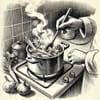Surgery messes up our lives in both predictable and unpredictable ways. I've had a dual hernia—one that occurs on both sides of the lower abdomen—for years. And it had become painful and enlarged, and it was time to get it repaired.
A hernia is a weakness in the thin casing—a mix of fascia and muscle—that holds your guts in. Hernias can occur at any age and for many reasons, but once you have had one, you are more likely to have another.
To make something clear right away, my dual hernia didn't happen because I worked out. People often say this, implying that hernias are largely the result of lifting too much. And yes, while it's possible for a sudden load, like lifting one's child, to cause a hernia in weakened abdominal muscles, that is not what happened here or what happens in most hernia cases.
My hernia was an inguinal hernia, which is the most common type. There are direct and indirect inguinal hernias; I was lucky enough to have both. They account for about three-quarters of all hernias among men. They happen when part of your bowel protrudes into your inguinal canal, a passageway that runs down your inner thigh. If it's not getting larger or causing pain or swelling, your inguinal hernia may not need to be repaired, and you can instead take a wait-and-watch approach.
Knowing Why Injuries Happen Can Help Us Prevent Them
Often, with injuries, it helps to understand why we are so prone to them, what that means about our fragility, and where we need to focus our preventative efforts. That hernias are common, and inguinal ones, in particular, are common among men, is worth understanding because it can help you see where to focus to prevent them.
So, why do hernias happen? There is a strong case to be made for an evolutionary explanation, in that our ancestors didn't have the gravitational stress of standing upright that we do. This causes focused pressure on the lower abdomen, especially from the abdominal organs themselves. This wouldn't be so bad if it weren't for the weird nature of the abdominal wall, where the upper abdominal muscles are protected by a sheath of tissue on the front and back, but the lower abdominal wall lacks such a sheath behind it. The absence of what is called a posterior rectus sheath makes the lower abdominal wall thinner, less protected, and more easily penetrated, leading to hernias, which can cause structures to get caught and even strangulated, which is as bad as it sounds, or worse.
This tells us at least two things. First, it tells us that evolution matters, and we ignore it at our peril. Second, it tells us that far from being the cause of hernias, abdominal wall strength and resilience is the way to work around the inherent limitations of our lower abdomen that cause hernias to happen, especially inguinal ones among men. A strong lower abdomen is, in short, protective against these hernias.
For our paid subscribers, we will dive deeper into why preparing for elective surgery matters and how muscle strength plays an outsized role in minimizing the risks associated with surgery and recovery. We will also discuss how "minor" procedures or injuries can play a role in the development of frailty decades later.
Read the full article
Sign up now to read the full article and get access to all articles for paying subscribers only.





